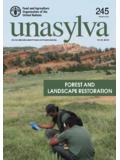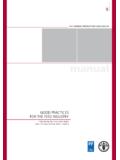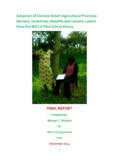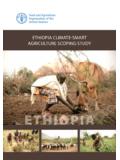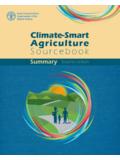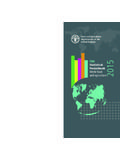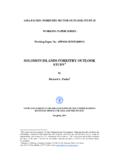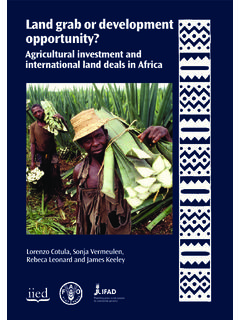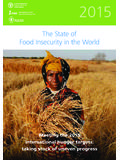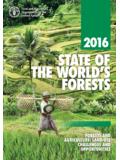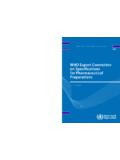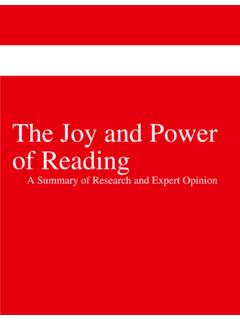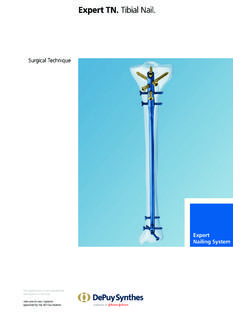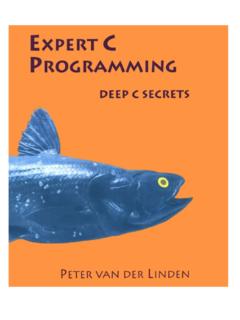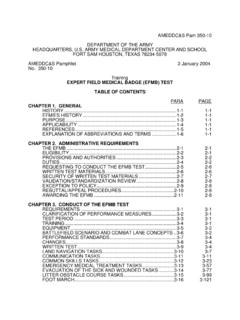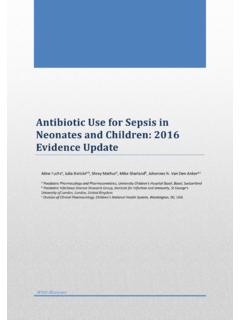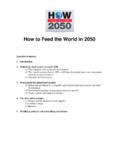Transcription of Report of the Joint FAO/WHO Expert Consultation …
1 FAO Fisheries and Aquaculture Report No. 978 FIPM/R978(En) ISSN 2070-6987 Report of the Joint FAO/WHO Expert Consultation ON THE RISKS AND BENEFITS OF FISH CONSUMPTION Rome, 25 29 January 2010 Copies of FAO publications can be requested from: Sales and Marketing Group Publishing Policy and Support Branch Office of Knowledge Exchange, Research and Extension FAO, Viale delle Terme di Caracalla 00153 Rome, Italy E-mail: Fax: +39 06 57053360 Web site: FAO Fisheries and Aquaculture Report No. 978 FIPM/R978(En) Report of the Joint FAO/WHO Expert Consultation ON THE RISKS AND BENEFITS OF FISH CONSUMPTION Rome, 25 29 January 2010 FOOD AND AGRICULTURE ORGANIZATION OF THE UNITED NATIONS WORLD HEALTH ORGANIZATION 2011 WHO Library Cataloguing-in-Publication Data Report of the Joint FAO/WHO Expert Consultation on the risks and benefits of fish consumption, 25 29 January 2010, Rome, Italy.
2 Contamination. products - toxicity. - toxicity. compounds - toxicity. poisoning. assessment. Health Organization. and Agriculture Organization of the United Nations. ISBN (FAO) 978-92-5-106999-8 ISBN (WHO) 978-92-4-156431-1 (NLM classification: WA 703) FAO/WHO , 2011 All rights reserved. Reproduction and dissemination of material in this information product for educational or other non-commercial purposes are authorized without any prior written permission from the copyright holders provided the source is fully acknowledged. Reproduction of material in this information product for resale or other commercial purposes is prohibited without written permission of the copyright holders. Applications for such permission should be addressed to Chief, Electronic Publishing Policy and Support Branch Publishing Policy and Support Branch Office of Knowledge Exchange, Research and Extension FAO, Viale delle Terme di Caracalla 00153 Rome, Italy E-mail: Fax: +39 06 57053360 Web site: or WHO Press World Health Organization 20 Avenue Appia 1211 Geneva 27, Switzerland Fax +41 22 7914806 Requests for permission to reproduce or translate WHO publications whether for sale or for noncommercial distribution should be addressed to WHO Press through the WHO web site ( ).
3 The designations employed and the presentation of material in this information product do not imply the expression of any opinion whatsoever on the part of the Food and Agriculture Organization of the United Nations or of the World Health Organization concerning the legal or development status of any country, territory, city or area or of its authorities, or concerning the delimitation of its frontiers or boundaries. The mention of specific companies or products of manufacturers, whether or not these have been patented, does not imply that these have been endorsed or recommended by the Food and Agriculture Organization of the United Nations or the World Health Organization in preference to others of a similar nature that are not mentioned. All reasonable precautions have been taken by the Food and Agriculture Organization of the United Nations and the World Health Organization to verify the information contained in this publication.
4 However, the published material is being distributed without warranty of any kind, either expressed or implied. The responsibility for the interpretation and use of the material lies with the reader. In no event shall the Food and Agriculture Organization of the United Nations or the World Health Organization be liable for damages arising from its use. This Report contains the collective views of an international group of experts and does not necessarily represent the decisions or the stated policy of the Food and Agriculture Organization of the United Nations or the World Health Organization. Printed in Italy. Recommended citation FAO/WHO (2011). Report of the Joint FAO/WHO Expert Consultation on the Risks and Benefits of Fish Consumption. Rome, Food and Agriculture Organization of the United Nations; Geneva, World Health Organization, 50 pp. iii PREPARATION OF THIS DOCUMENT The thirty-eighth Session of the Codex Committee on Food Additives and Contaminants requested the Codex Alimentarius Commission, at its twenty-ninth Session in 2006, to seek scientific advice from the Food and Agriculture Organization of the United Nations (FAO) and the World Health Organization (WHO) on the risks and benefits of fish consumption: specifically, a comparison of the health benefits of fish consumption with the health risks associated with the contaminants methylmercury and dioxins (defined here to include polychlorinated dibenzo-p-dioxins [PCDDs] and polychlorinated dibenzofurans [PCDFs] as well as dioxin-like polychlorinated biphenyls [PCBs]) that may be present in fish.
5 The Codex Alimentarius Commission request was driven by growing public concern in recent years regarding the presence of chemical contaminants in fish. Over the same period, the multiple nutritional benefits of including fish in the diet have become increasingly clear. FAO and WHO held an Expert Consultation on the Risks and Benefits of Fish Consumption from 25 to 29 January 2010 at FAO headquarters in Rome, Italy. Data on levels of nutrients and specific chemical contaminants (methylmercury and dioxins) in a range of fish species were reviewed, as well as recent scientific literature covering the risks and benefits of fish consumption. The review was used to consider risk-benefit assessments for specific end-points, including for sensitive groups of the population. ACKNOWLEDGEMENTS The Food and Agriculture Organization of the United Nations (FAO) and the World Health Organization (WHO) would like to express their appreciation to all those who contributed to this Expert Consultation and the preparation of this Report , whether by providing their time and expertise, data and other relevant information or by reviewing and providing comments on the document.
6 Appreciation is also extended to all those who responded to the call for information that was issued by FAO and WHO and thereby drew our attention to references that were not readily available in the mainstream literature and official documentation. We are sincerely thankful for the budgetary contributions from the Norwegian Ministry of Fisheries and Coastal Affairs, the Japanese Ministry of Health, Labour and Welfare, the Nordic Council of Ministers and the Food and Drug Administration of the United States of America, which allowed us to organize and carry out the Expert Consultation . iv FAO/WHO . Report of the Joint Expert Consultation on the Risks and Benefits of Fish Consumption. Rome, 25 29 January 2010. FAO Fishery and Aquaculture Report . No. 978. Rome, FAO. 2011. 50 pp. ABSTRACT The Food and Agriculture Organization of the United Nations and the World Health Organization convened a Joint Expert Consultation on the Risks and Benefits of Fish Consumption from 25 to 29 January 2010.
7 The tasks of the Expert Consultation were to review data on levels of nutrients (long-chain omega-3 fatty acids) and specific chemical contaminants (methylmercury and dioxins) in a range of fish species and to compare the health benefits of fish consumption and nutrient intake with the health risks associated with contaminants present in fish. The Expert Consultation drew a number of conclusions regarding the health benefits and health risks associated with fish consumption and recommended a series of steps that Member States should take to better assess and manage the risks and benefits of fish consumption and more effectively communicate these risks and benefits to their citizens. The output of the Expert Consultation is a framework for assessing the net health benefits or risks of fish consumption that will provide guidance to national food safety authorities and the Codex Alimentarius Commission in their work on managing risks, taking into account the existing data on the benefits of eating fish.
8 The Expert Consultation concluded the following: Consumption of fish provides energy, protein and a range of other important nutrients, including the long-chain n-3 polyunsaturated fatty acids (LCn3 PUFAs). Eating fish is part of the cultural traditions of many peoples. In some populations, fish is a major source of food and essential nutrients. Among the general adult population, consumption of fish, particularly fatty fish, lowers the risk of mortality from coronary heart disease. There is an absence of probable or convincing evidence of risk of coronary heart disease associated with methylmercury. Potential cancer risks associated with dioxins are well below established coronary heart disease benefits from fish consumption. When comparing the benefits of LCn3 PUFAs with the risks of methylmercury among women of childbearing age, maternal fish consumption lowers the risk of suboptimal neurodevelopment in their offspring compared with the offspring of women not eating fish in most circumstances evaluated.
9 At levels of maternal exposure to dioxins (from fish and other dietary sources) that do not exceed the provisional tolerable monthly intake (PTMI) of 70 pg/kg body weight established by JECFA (for PCDDs, PCDFs and coplanar PCBs), neurodevelopmental risk for the fetus is negligible. At levels of maternal exposure to dioxins (from fish and other dietary sources) that exceed the PTMI, neurodevelopmental risk for the fetus may no longer be negligible. Among infants, young children and adolescents, the available data are currently insufficient to derive a quantitative framework of the health risks and health benefits of eating fish. However, healthy dietary patterns that include fish consumption and are established early in life influence dietary habits and health during adult life. v DECLARATION OF INTERESTS The Secretariat ensured that all experts participating in the Expert Consultation had completed declaration of interest forms.
10 Sixteen out of 17 experts declared no substantial economic interest in the topics discussed. One Expert had received research grants from industry, but there was no involvement that was considered to be a potential conflict of interest with the issues to be discussed at the meeting. FURTHER INFORMATION For further information, please contact: Fisheries and Aquaculture Policy and Economics Division Food and Agriculture Organization of the United Nations Viale delle Terme di Caracalla, 00153 Rome, Italy Fax: +39 06 57055188 E-mail: Web site: or Department of Food Safety and Zoonoses World Health Organization 20 Avenue Appia 1211 Geneva 27 Switzerland Fax: +41 22 7914807 E-mail: Web site: vi ACRONYMS AND ABBREVIATIONS ALSPAC Avon Longitudinal Study of Parents and Children BENERIS Benefit Risk Assessment for Food: An Iterative Value-of-Information Approach BRAFO Benefit Risk Analysis of Foods CI confidence interval DALY disability-adjusted life year DHA docosahexaenoic acid DPA docosapentaenoic acid EFSA European Food Safety Authority EPA eicosapentaenoic acid FAO Food and Agriculture Organization of the United Nations IOM Institute of Medicine IQ intelligence quotient JECFA Joint FAO/WHO Expert Committee on Food Additives and Contaminants LCn3 PUFA long-chain n-3 polyunsaturated fatty acid PCB polychlorinated biphenyl PCDD polychlorinated dibenzo-p-dioxin PCDF polychlorinated dibenzofuran PTMI provisional
